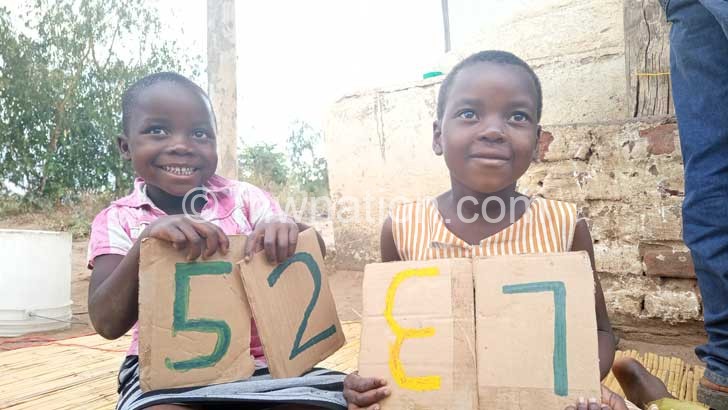Learning amid Covid-19
Emily Leston was devastated when coronavirus disrupted learning on March 31.
“Every day, children ask me why they aren’t going to school. They don’t know that they are safer staying at home than in crowded classrooms. They want to get back to school,” says the mother- of-three based in Traditional Authority Ngwelero, Zomba.
Leston is terrified that the global pandemic discovered in China last December has killed 25 of 1 942 confirmed cases in Malawi by Thursday.
As it speeds up, a radio receiver that announced its start six months ago has become handy for her last-born, Thandiwe, to keep learning. The five-year-old and her peers have been idling since Nkundi Community-Based Childcare Centre (CBCC) closed in March.
At 2pm, Leston and four children gather around a solar-powered radio receiver to listen to interactive lessons aired by Chanco Radio in Zomba, Phalombe and Chiradzulu. The mix on air range from numbers to letters, sizes to colours, sounds to shapes.

“The children have been hit hard. As we learn to live with coronavirus, we must find new ways of home schooling,” she says.
Leston is convinced that early childhood development (ECD) offers children a solid start in life.
She states: “When children get to Standard One without any ECD, they don’t do well in class and teachers suffer.”
The mother does not want children to waste time.
Through Tiyende radio programme broadcast with support from Save the Children, they have been learning to distinguish objects of different size, weight, colour and sounds since May 4 when it was airing on Mondays and Wednesdays.
Now it airs every day from 2 to 2.30pm so that children can learn when their parents are back from the fields and done with daily chores.
The children wash hands with soap before they sit far apart around the radio. Hand hygiene is known to remove the fatty virus to reduce infection when one touches the mouth, nose and eyes.
“The water point is far and soap is costly, but everyone must be safe and live to see learning return,” Leston states, taking the children through “small things” they cannot master alone.
And the lessons have brought her closer to the children.
“They now trust me. They open up to me and some come hours before lessons begin to share with me what they are going through,” she explains.
Shakira Malemba, one of eight caregivers at Nkundi CBCC, has been volunteering since 2009. Before the Covid-19 emergency, the caregivers were caring for 32 girls and 29 boys.
Now the 32-year-old walks from home to home, helping guardians support the children to reap benefits of the interactive radio programmes.
She explains: “Tiyende targets five-year-olds on the verge of going to primary school. It opens their minds and walks with them to build a strong foundation for a better future.
“It is so flexible that parents are seen playing with children while imparting vital lessons for future use. Although the children are not going to CBCCs, they won’t miss or forget much by the time schooling returns.”
The caregiver is happy that there is no holiday for the children, saying: “When the pandemic is over, they won’t be found empty-headed.”
The radio programmes, which first aired to 40 children from 20 families on May 4, now reach thousands stuck at home.
Trials in Zomba, Mangochi, Chiradzulu, Kasungu and Mchinji since 2009 have shown that children using radio programmes as learning aids outperform the have-nots.
In 2013, Save the Children took the pre-recorded programmes from delicate compact discs for its target CBCCs to Dzimwe Community Radio Station to broaden access to lessons developed by specialists in line with ECD standards and curriculum.
The national ECD policy promotes the use of radio for teaching and learning with community participation.
In Phalombe, T/A Mbiza goes door-to-door to ensure every child learns and parents take the lead. Some families without radio sets listen on mobile phones while others join their neighbours.
On June 1, the programme started airing on eight more community radio stations to reach almost 2.2 children nationwide. The broadcasters include Tuntufye, Voice of Livingstonia, Mzimba, Nkhoma, Mudziwathu, Dzimwe, Gaka and Blantyre Synod.
Looking back, Save the Children senior technical advisor for education and child development Lexon Ndalama says: “The interactive radio instruction programme started in 2013 when we noted that most caregivers in CBCCs were not well trained and our audio methods were limited to areas where we were working.
“This has broadened the reach of ECD lessons. I am happy that the children are attracted to attend the interactive sessions, caregivers are mastering how to handle ECD lessons and parents have become more supportive.”





